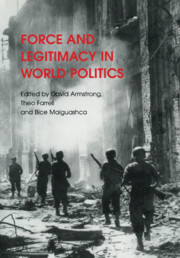Book contents
- Frontmatter
- Contents
- Notes on contributors
- Introduction
- 1 Legitimacy and the use of force: can the circle be squared?
- 2 Legality and legitimacy: the quest for principled flexibility and restraint
- 3 Not yet havoc: geopolitical change and the international rules on military force
- 4 Liberal hierarchy and the licence to use force
- 5 The age of liberal wars
- 6 Force, legitimacy, success and Iraq
- 7 War and international relations: a military historical perspective on force and legitimacy
- 8 The judgement of war: on the idea of legitimate force in world politics
- 9 Discourses of difference: civilians, combatants and compliance with the laws of wars
- 10 Fights about rules: the role of efficacy and power in changing multilateralism
- 11 Peacekeeping and enforcement action in Africa: the role of Europe and the obligations of multilateralism
- 12 Identity, legitimacy and the use of military force: Russia's Great Power identities and military intervention in Abkhazia
- 13 Dead or alive: American vengeance goes global
- Index
8 - The judgement of war: on the idea of legitimate force in world politics
Published online by Cambridge University Press: 06 July 2010
- Frontmatter
- Contents
- Notes on contributors
- Introduction
- 1 Legitimacy and the use of force: can the circle be squared?
- 2 Legality and legitimacy: the quest for principled flexibility and restraint
- 3 Not yet havoc: geopolitical change and the international rules on military force
- 4 Liberal hierarchy and the licence to use force
- 5 The age of liberal wars
- 6 Force, legitimacy, success and Iraq
- 7 War and international relations: a military historical perspective on force and legitimacy
- 8 The judgement of war: on the idea of legitimate force in world politics
- 9 Discourses of difference: civilians, combatants and compliance with the laws of wars
- 10 Fights about rules: the role of efficacy and power in changing multilateralism
- 11 Peacekeeping and enforcement action in Africa: the role of Europe and the obligations of multilateralism
- 12 Identity, legitimacy and the use of military force: Russia's Great Power identities and military intervention in Abkhazia
- 13 Dead or alive: American vengeance goes global
- Index
Summary
The twenty first century has opened, as so many centuries before it, with the drum roll of war depressingly audible. The optimism of the early 1990s that world politics was being remade, and that the threat of serious conflict was receding, vanished along with the twin towers that were so much a symbol of that world, one heart-breakingly beautiful September morning in 2001. And with the return of force and war to the forefront of international politics, so come the inevitable questions; when, under what circumstances, in what manner and with what restraint, may we (whoever the we might be) use force to secure our interests, protect our families, defend our communities or our values?
My aim in this article is to consider the idea of morally legitimate force in world politics. That will involve (how could it not?) saying something about the jurisprudential status of certain key contemporary ideas about legitimacy more generally, and especially with the idea of legality, but it is with moral legitimacy, rather than with legitimacy of other kinds, that I am centrally concerned here. This distinction is an important one to make in part (as we shall see in a moment) because a good deal of discussion about the ‘legitimacy of the use of force’ in the contemporary period elides the distinction or, worse, assumes that there is no distinction at all, but also because I need to stipulate from the beginning that I am concerned with one particular aspect of the understanding of the contemporary use of force (ways of morally justifying it, if one can) without denying that one can approach it from a number of other angles of vision.
- Type
- Chapter
- Information
- Force and Legitimacy in World Politics , pp. 143 - 162Publisher: Cambridge University PressPrint publication year: 2006

